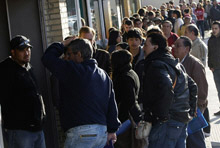
Typical street scene in Santa Ana, El Salvador. (Photo: iStock)
IMF Survey: Trade Protectionism Could Slow Global Recovery, says IMF
April 16, 2010
- New trade restrictions have caused decline in trade
- High unemployment, unwinding stimulus may increase pressures
- Conclude Doha trade negotiations to support recovery
Restrictions on trade imposed by countries trying to protect their economies facing tough times could make it harder for them to recover from the global economic crisis, according to new findings by the IMF staff.

Unemployed workers in Spain: high unemployment may increase protectionist pressures on trade, said the IMF (photo: Sergio Perez/Reuters)
TRADE & THE GLOBAL ECONOMIC CRISIS
While most countries have resisted a widespread effort to protect trade, an IMF staff paper said that trade has dropped on average up to 8 percent in products and services where new restrictions were imposed. If protectionist trade measures were allowed to balloon, it could harm global trade and stifle the global economic recovery, according to the research.
The paper, “Trade and the Crisis: Protect or Recover,” released on April 16, argues that so far, the impact on global trade has been modest, at about 0.25 percent.
The troubling news is what this means for countries as they struggle to emerge from the biggest recession in since the Second World War. Protectionism pressures may rise, given continued high unemployment, different growth rates across countries, and governments scaling back their spending, according to the paper.
Avoid the mistakes of the 1930s
The collapse in trade as a result of the deepening economic crisis in 2008 was sudden and sharp. Global trade fell almost 18 percent between 2008 and January 2009. Since then, there has been a recovery, with trade back to 90 percent of pre-crisis levels.
To date, political leaders have kept in mind the lessons of the Great Depression, and have promised to refrain from raising new barriers to trade, the paper said. Countries have followed the rules of the road set up under the World Trade Organization (WTO).
Risks remain, given the combined strain on governments as unemployment rises and their ability to spend their way out of the crisis drops.
Additional pressures weighing on policymakers, which could lead them down the protectionist path according to the paper, include
• high commodity prices
• a surge in capital inflows, which may lead to a rapid appreciation of the currency
• growing economic imbalances.
Wrap up global trade deal
The pace of liberalizing trade rules slowed beginning in the mid-2000s, which left substantial trade restrictions in place.
The measures taken so far by countries to protect their trade seem by and large to be allowed under the rules of the WTO.
In the years before the crisis, advanced and emerging economies reduced their tariffs on goods, in many cases to levels far below the ceiling established under the global trade rules. This means that countries can raise their tariffs and remain within the range allowed by the WTO.
Measures taken to protect trade since 2008 were in the form of tariffs, import bans or quotas, trade remedies such as antidumping and countervailing duties, as well as safeguard measures. Measures were also taken in public procurement policies, subsidies, product standards, and other more opaque “behind the border” forms.
The IMF paper said the surest way to avoid the use of more protectionist measures is to conclude the current round of WTO trade negotiations, known as the Doha round.
By reaching agreement countries would tighten global trade rules across a wide range of areas, including anti-dumping, food aid, services, and subsidies.
Policymakers should see concluding the Doha round of trade negotiations as part of their exit policy from the global economic crisis, the paper said.


